Booking Pinochet
The bloody Chilean dictator is a whisker away from trial. Marc Cooper weighs in on the significance of the recent booking of the 90-year-old General Augusto Pinochet.“The arc of the moral universe is long, but it bends towards justice.”
— Theodore Parker
During those horrible morning hours of the first Sept.11, the Chilean military coup of 1973, President Salvador Allende gave his farewell speech to the nation over the radio. I listened to his crackling, metallic voice along with millions of others as Allende raced to get out his final words before the tanks and planes of the military would bombard the radio transmitter, silence him and obliterate Chilean democracy.
A long dark night of felonious repression was coming, Allende said. But “make sure you know,” he said to his nation minutes before his death, “that sooner rather than later” Chileans would once again live in a better society where justice would prevail.
For more than three decades, that was a tough promise to hang on to. But last Wednesday, almost under the international media radar, something happened that those of us who survived the coup–and the families of those who didn’t–had waited for since Allende uttered those words 32 years ago.
Chilean detectives and judicial officers went to the door of 90-year-old General Augusto Pinochet–leader of the 1973 coup and the man who imposed 17 years of bloody dictatorship on his country–and then proceeded to enter his suburban Santiago mansion and fingerprint him and take his mug shot as if he were any other criminal.
It was a stunning moment not only for those of us who have always opposed Pinochet but also for anyone in the world who cares about human rights. Here was the arrogant, once untouchable dictator, who during his reign boasted that “not a leaf moves in Chile if I don’t know about it,” finally being brought to justice.
Pinochet had been under house arrest for several weeks after being formally indicted in November for the killing and disappearance of nine dissidents in 1975. They were, in turn, part of a larger group of 119 people whom Pinochet’s regime had secretly disposed of and whose deaths had been covered up. During his years in power, Pinochet’s dictatorship was responsible for more than 3,100 political murders, the torture of literally tens of thousands of arrestees and the exile of hundreds of thousands.
With his booking last Wednesday, Pinochet has moved a bare whisker away from formal trial. On two previous occasions in the last three years, the former dictator came to the brink of trial on other human rights charges but was saved by higher courts that ruled him too ill for prosecution. But this time around, Pinochet’s luck may have run out, and the amazing spectacle of the dictator sitting in the dock might just materialize. Move over, Saddam.
The mug shots became inevitable after a Dec. 26 decision against Pinochet by the Chilean Supreme Court brushed away a full year’s worth of legal appeals and maneuvering. Once a last-resort bastion of support for Pinochet, the high court may now become his worst nightmare.
Perhaps: Whatever residual and fading sympathy existed for Pinochet had virtually evaporated in early 2005 when a scandal around the U.S. financial institution, Riggs Bank, broke wide open. A subsequent inquiry by two Chilean judges revealed that Pinochet and his relatives had accumulated an illicit fortune of about $27 million.
This past summer, Pinochet’s 81-year-old wife, Luca Hiriart, and their youngest son, Marco Antonio, were busted on charges of money laundering and tax evasion related to the Riggs scandal. And as the investigations into the Riggs affair deepened, and the evidence that Pinochet was not only a murderer but also a world-class thief escalated, the Chilean political right scurried to distance itself from the dictator it once adored.
So desperate has Pinochet’s plight become, so abandoned is he, that press reports say he will spend this New Year’s in the company of only two former subordinates and his chief lawyer, Pablo Rodriguez. Let it be noted that Rodriguez, in the time of Pinochet’s ascendancy, led a neo-Nazi street gang enamored of Hitlerian salutes and swastikas.
As recently as 1998, Pinochet–who had been installed in power with support of the CIA–had seemed invulnerable. Lionized by the Chilean right and feared by the left, he swaggered as an unelected senator-for-life almost a decade after civilian rule had been reestablished. But his 1998 arrest on a Spanish warrant while visiting London, and his resulting 500 days in British custody before being sent back home, set off a political earthquake in Chile and began a reversal of fortune of truly titanic proportions.
An intrepid Chilean judge, Juan Guzman Tapia, indicted Pinochet shortly after he arrived back in Chile, and the wall of impunity built around the former dictator had finally been breached. One of the most satisfying moments in my life came in the spring of 2002 when Judge Guzman had me testify as a witness in his probe of the role of Pinochet–and of American officials–in the 1973 murder of my friend Charles Horman. Charlie was arrested and killed by Chilean forces during the first week of Pinochet’s regime and became the subject of the classic Costa-Gavras film, “Missing.” At the time of my court appearance, the judge wryly lamented how the center-left civilian government in Chile had starved him of resources and had failed to provide him with as much as a copying machine. He laughed it off and plowed ahead.
Few Chilean politicians of the right or left, in fact, showed enough gumption to vigorously support Pinochet’s prosecution, and most would have preferred to have swept the whole lingering human rights issue under the rug. They wouldn’t have minded shipping Judge Guzman off to some remote venue either. Even in this month’s presidential election, all the candidates, including Socialist front-runner Michelle Bachelet, had declared Pinochet a figure of the past. But a man responsible for so much death and pain carries with him far too many ghosts and demons to be quietly packed off into history. Feckless politicians might dread dredging up an uncomfortable past, but those directly affected by the dictatorship’s abuses, and those with a moral conscience, have much longer memories and a much greater thirst for justice.
So it is that a few weeks from now, on Jan. 15, when the presidential runoff vote takes place between the favorite, Bachelet, and her conservative rival, Sebastian Pinera, the Old Dictator will be right in the midst of it all, clanking his chains. Hopefully, they will be literal and not figurative, made of heavy cast iron, and not solely of dreams and aspirations cut short and buried in early, clandestine and sometimes watery graves.
Marc Cooper is a contributing editor to The Nation and a senior fellow at USC Annenberg’s Institute for Justice and Journalism and was a translator for then-Chilean President Salvador Allende.
Your support matters…Independent journalism is under threat and overshadowed by heavily funded mainstream media.
You can help level the playing field. Become a member.
Your tax-deductible contribution keeps us digging beneath the headlines to give you thought-provoking, investigative reporting and analysis that unearths what's really happening- without compromise.
Give today to support our courageous, independent journalists.
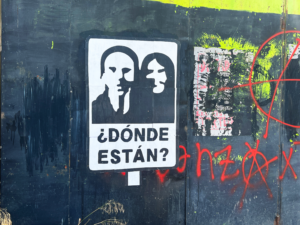
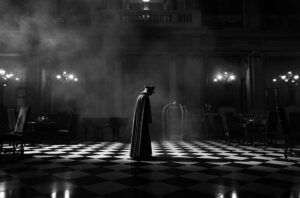
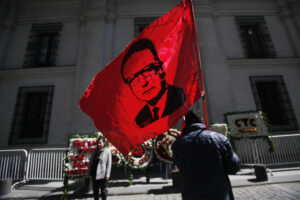
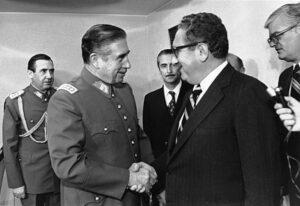
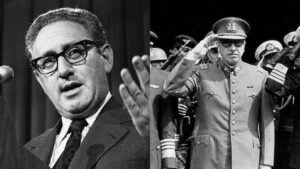
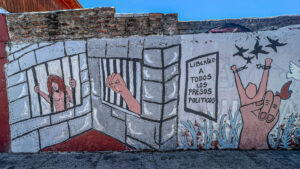
You need to be a supporter to comment.
There are currently no responses to this article.
Be the first to respond.